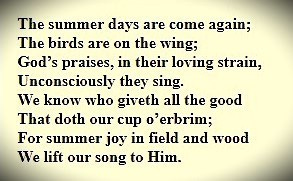The good Christian believes that there is not one moment of his life, not one inch of space, not one atom of his flesh and blood, that does not belong to God. There isn’t some ordinary indifferent thing over here, like the lilies of the field or the birds of the air, or the yeast a woman kneads into some dough, or a mustard seed smaller than any other seed, and some sacred thing over there, like a church. And that means that we can and should dedicate to God every season — including the one we’re now in, at least those of us in the northern hemisphere; our many friends in Brazil and Australia will have to bear with us in our being upside-down from them!
The fruits are now ripening on the trees, and whenever that happens, it brings me again in mind of two blessed summers when I was a little boy. We rented a small house in Allentown, Pennsylvania, a house I loved, not least because in the back we had a swimming pool built in the ground, and surrounded with fruit trees — apple, plum, peach, and apricot, and the peaches and apricots were so plentiful, we used to bring back to our cousins in northern Pennsylvania big bags of them. It’s the only time I’ve ever eaten an apricot ripe from a tree. They were soft and sweet, not like the ones you usually get in the store, that are hard as golf balls — that have to be picked before they’re ripe, to get through the transport in a truck.
I’d get plenty of other fruit from my summers, too, the fruit of exploring the woods, playing ball, and having time to think without being interrupted by school. And maybe, if we’re to sing hymns in the summertime, they ought to be hymns of freedom! But for our Hymn of the Week I’ve chosen a delightful short poem by Samuel Longfellow, little brother of the famous poet Henry, specifically dedicated to the summer.
That’s right, dedicated to the summer. You see, in the wonderful second edition of The English Hymnal (1933), compiled by Ralph Vaughan Williams and his collaborators, there’s a section called “Times and Seasons,” and one hymn for each of the four seasons (actually, there are five for harvest, but that’s to celebrate what you do in the autumn, and not exactly the season itself, which does merit its own hymn too). So then we thank God for the seasons in turn, and that’s a fine thing to do, because “the earth is the Lord’s, and the fullness thereof.” Our hymn is called “The Summer Days Are Come Again,” and my hymnal sets it to a 1637 German melody called Soll’s Sein — meaning, “Shall It Be?” We haven’t been able to find any good clip of people singing it, but we are including a fine organ accompaniment with the tune, by organist John Keys, and also an organ piece we found by the way, “Soll Es Sein,” composed at about the same time as the other German melody.
As for the poem itself, it’s very fine, in an easy and understated way. The birds are on the wing, but so are our thoughts. The sun is shining above, and so it is too in our “happy moods / Of love and joy and prayer.” The birds sing the praise of God “unconsciously,” but we are aware: we do know, says Longfellow the younger, thinking of the words of that most beloved of all the psalms, who it is that makes our cup to brim over.
The summer days are come again; Once more the glad earth yields Her golden wealth of ripening grain, And breath of clover fields, And deepening shade of summer woods, And glow of summer air, And winging thoughts, and happy moods Of love and joy and prayer. The summer days are come again; The birds are on the wing; God's praises, in their loving strain, Unconsciously they sing. We know who giveth all the good That doth our cup o'erbrim; For summer joy in field and wood We lift our song to Him.
The above organ piece is by Baroque composer and organist, Samuel Scheidt (SSWV 136). The very fine organist is Michael Dierks.





I don't know. Seems to me that the Texas summer pretty much belongs to the evil one.
The perfect hymn for the closing of the school year before summer break.